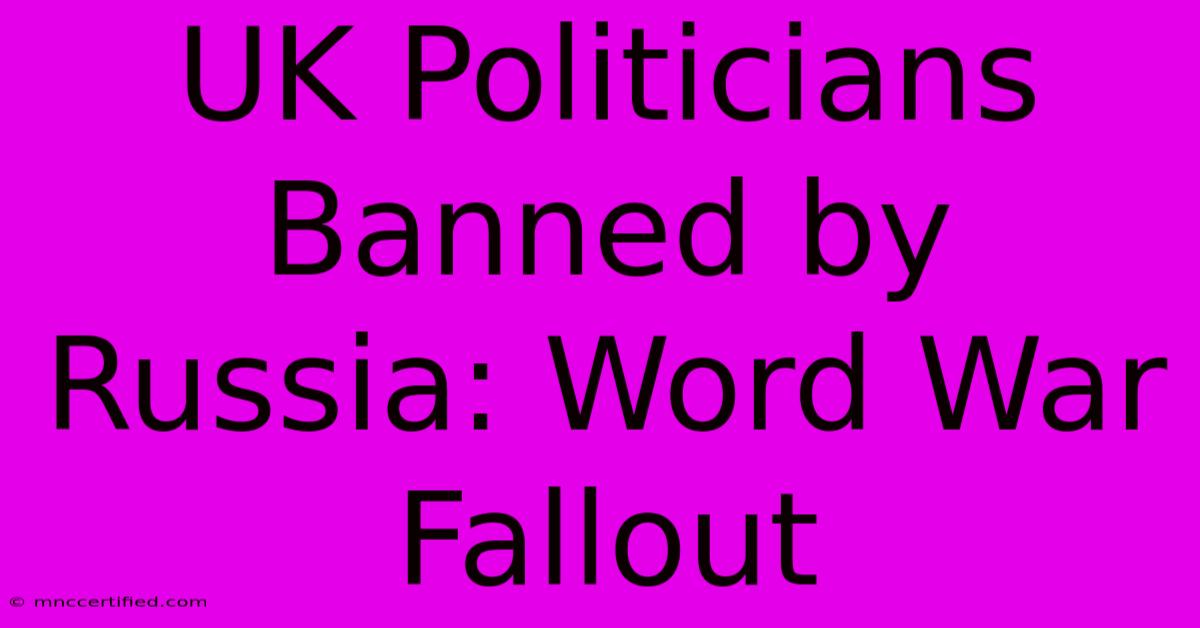UK Politicians Banned By Russia: Word War Fallout

Table of Contents
UK Politicians Banned by Russia: Word War Fallout
The ongoing conflict in Ukraine has dramatically reshaped geopolitical landscapes, leading to unprecedented sanctions and retaliatory measures. One significant consequence has been the banning of several prominent UK politicians by Russia, a move framed by Moscow as a response to UK sanctions and support for Ukraine. This article delves into the specifics of these bans, examining their implications and the broader context of the escalating word war between the two nations.
Who are the Banned UK Politicians?
Russia's sanctions haven't targeted a single, easily identifiable group. The list of banned UK politicians is fluid and often announced with little fanfare through official government channels. While a comprehensive, publicly accessible list is difficult to compile, confirmed bans include high-profile figures involved in shaping UK foreign policy and expressing vocal support for Ukraine. This often includes:
- Members of Parliament (MPs): Many MPs known for their outspoken criticism of the Russian government and its actions in Ukraine have been targeted. These individuals frequently serve on foreign affairs committees or hold influential positions within their respective parties.
- Government Ministers: Ministers holding key portfolios like Defence or Foreign Affairs have been included in the sanctions list. Their involvement in formulating and executing UK policy towards Russia makes them prime targets for retaliatory action.
- Other Public Figures: The bans aren't exclusively limited to elected officials. Prominent figures in media and think tanks who have publicly condemned Russia's actions may also find themselves subject to travel restrictions and asset freezes.
It's crucial to understand that the Russian government rarely provides a detailed explanation for these bans, often citing vague accusations of "unfriendly actions" or "anti-Russian sentiment."
The Implications of the Bans
The impact of these bans varies. While seemingly symbolic, they carry several significant implications:
- Limited Travel: Banned individuals are prohibited from entering Russia. This restricts their ability to conduct diplomatic engagements, attend conferences, or engage in any activities within Russian territory.
- Asset Freezes (Potential): While not always explicitly stated, bans can potentially lead to asset freezes, although this is less frequently reported in the case of UK politicians. The threat, however, remains a powerful deterrent.
- Symbolic Gesture: The bans serve as a potent symbol of the deteriorating relationship between the UK and Russia. They represent a clear escalation in the ongoing information warfare and demonstrate the depth of the conflict.
- Impact on Diplomacy: While direct diplomatic channels remain open, these bans hinder informal interactions and people-to-people diplomacy, potentially complicating efforts to de-escalate tensions.
The Broader Context: The Word War
The banning of UK politicians is part of a larger information war between Russia and the West. This "word war" involves the strategic use of propaganda, disinformation, and sanctions to influence public opinion and undermine the adversary. Russia’s actions are often viewed as a form of retaliation against the UK’s support for Ukraine and the sanctions imposed on Russia.
This information war is multifaceted and includes:
- State-controlled media: Russian state-controlled media outlets often disseminate narratives that justify the invasion of Ukraine and portray the West, particularly the UK and US, as aggressors.
- Disinformation campaigns: The spread of false or misleading information online aims to sow discord, undermine trust in Western institutions, and manipulate public opinion.
- Cyberattacks: Cyber warfare plays a significant role, with accusations of hacking and disruption of critical infrastructure frequently exchanged between the two sides.
Conclusion: Navigating a Complex Geopolitical Landscape
The banning of UK politicians by Russia is a significant event that reflects the strained relationship between the two countries. While the immediate impact might seem limited, these actions are part of a broader strategy of information warfare and represent a serious escalation in geopolitical tensions. Understanding the context of these bans within the broader framework of the conflict in Ukraine is crucial for comprehending the complexities of the current international landscape. The future will likely see further escalations and responses, highlighting the need for careful analysis and nuanced understanding of the ongoing conflict and its implications.

Thank you for visiting our website wich cover about UK Politicians Banned By Russia: Word War Fallout. We hope the information provided has been useful to you. Feel free to contact us if you have any questions or need further assistance. See you next time and dont miss to bookmark.
Featured Posts
-
Kimpembe Back Psg Vs Bayern Clash
Nov 27, 2024
-
Parkers Guide Insurance Groups
Nov 27, 2024
-
Josh Sherrill Insurance Agency
Nov 27, 2024
-
Monadnock Insurance Jaffrey Nh
Nov 27, 2024
-
Request For Proposal Insurance
Nov 27, 2024